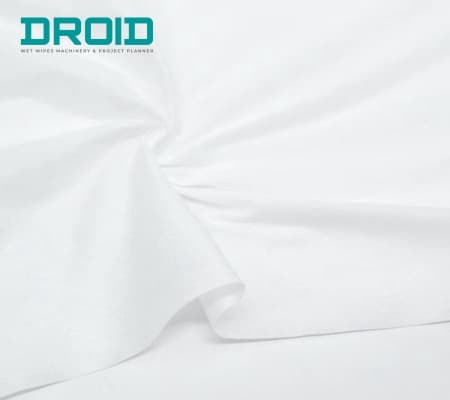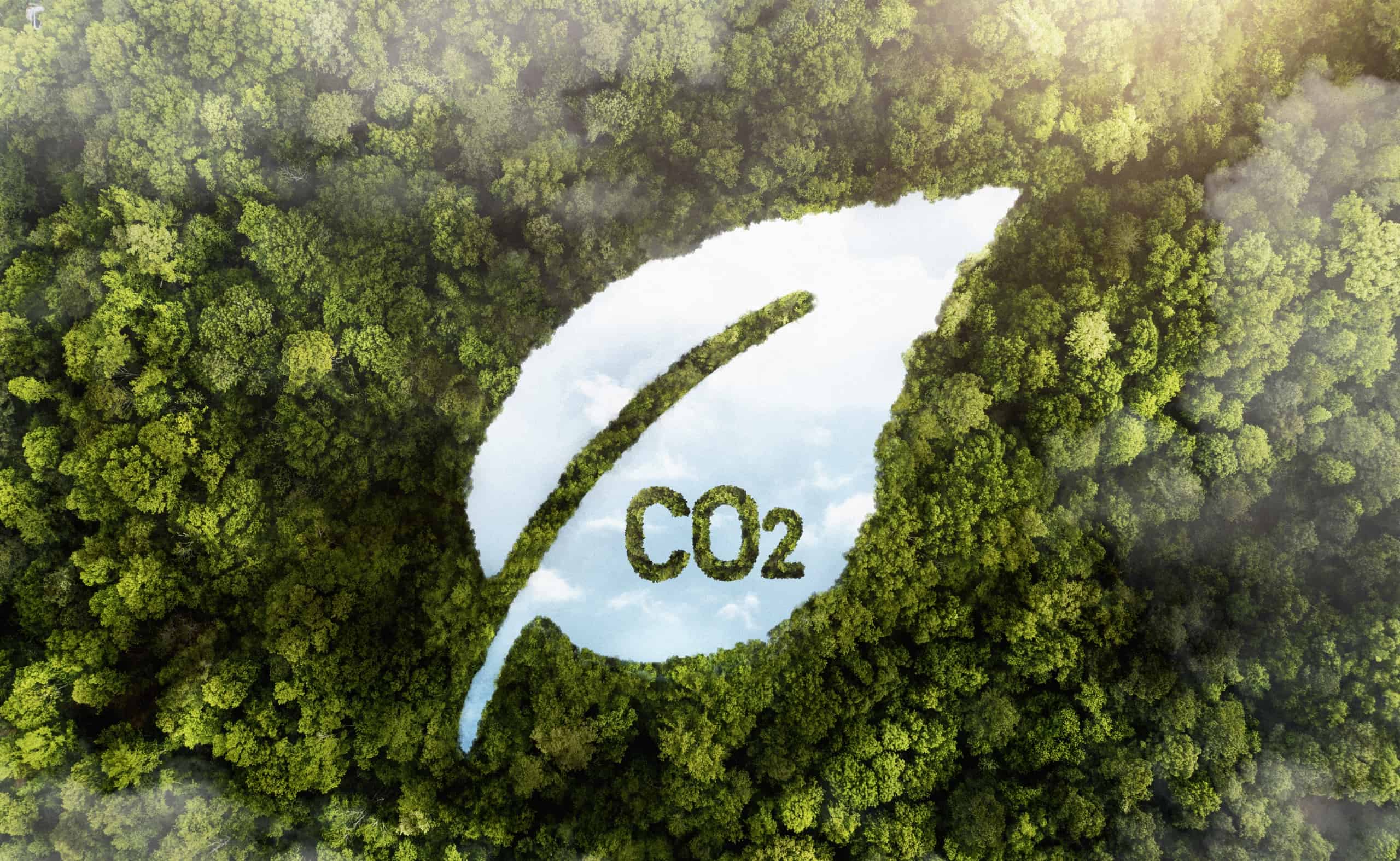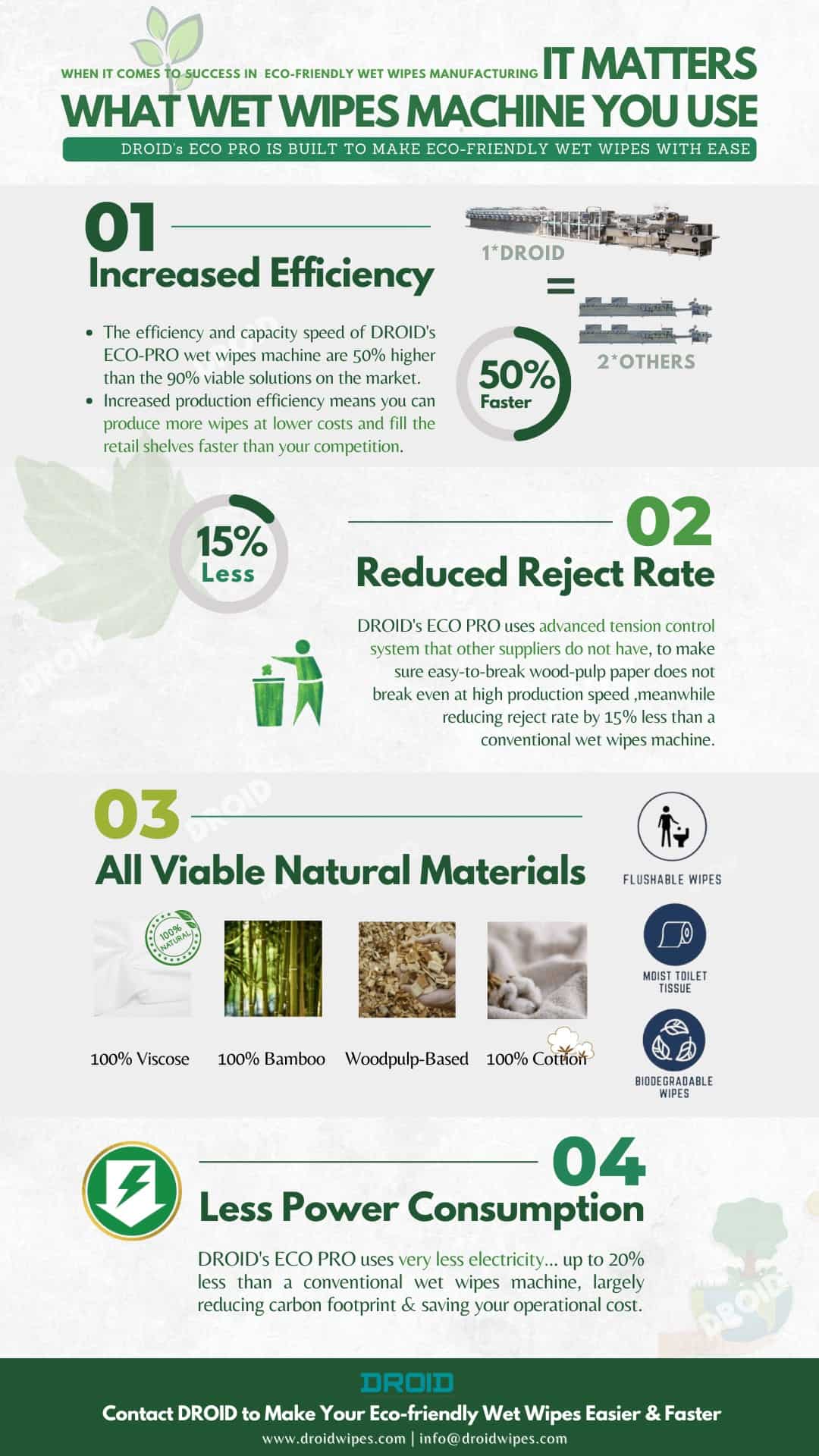1. Biodegradable Fibers
Biodegradable fibers are becoming more and more important in the wet wipes business since they can naturally break down, which helps to decrease their effect on the environment. These fibers are obtained from sustainable sources, making them a viable substitute for conventional synthetic materials such as polyester and polypropylene, which may take many centuries to decompose. Utilizing biodegradable fibers not only reduces waste but also meets the increasing customer demand for environmentally friendly goods.
Bamboo is well recognized as one of the most popular biodegradable fibers. Bamboo is an exceptional plant that exhibits quick growth and has low requirements for resources such as water and pesticides. As a result, it becomes an exceptionally sustainable crop. Bamboo fibers include inherent characteristics of softness, strength, and exceptional absorbency, making them exceptionally suitable for the production of wet wipes. Moreover, bamboo fibers have antibacterial characteristics, hence enhancing the product’s level of cleanliness. Bamboo wipes decompose more rapidly than traditional wipes when discarded, leading to a substantial decrease in landfill trash.
Cotton is a commonly used biodegradable fabric in wet wipes. Organic cotton is cultivated without the use of synthetic fertilizers and pesticides, making it a more ecologically sustainable choice. Cotton fibers provide a mild quality that makes them appropriate for delicate applications, such as the production of baby wipes and face-washing wipes. Despite cotton cultivation’s higher water requirements compared to bamboo, developments in agricultural methods are effectively addressing this concern, making cotton a feasible and sustainable option for wet wipes.
Viscose, or rayon, is a partially synthetic fabric produced from natural cellulose, usually obtained from wood pulp. It amalgamates the characteristics of both natural and synthetic fibers, providing exceptional absorbency and a smooth texture. Viscose fibers have the quality of being biodegradable, meaning they may naturally break down and dissolve at a faster rate compared to synthetic materials. They are often used in combination with other fibers to improve the resilience and smoothness of wet wipes. Wet wipes manufacturers are progressively embracing more environmentally friendly techniques to guarantee the sustainability of viscose manufacturing, which inherently entails chemical processes.
Utilizing biodegradable fibers in wet wipes effectively tackles environmental issues while also satisfying the growing customer need for sustainable and conscientious goods. Wet wipes manufacturers may cater to an expanding market of environmentally aware customers by using biodegradable materials such as bamboo, cotton, and viscose to create top-notch, eco-friendly wet wipes. The use of biodegradable fibers in disposable hygiene products is a substantial advancement in minimizing the environmental impact.
2. Recycled Polyester
Recycled polyester, or rPET, is a cutting-edge material that is becoming more popular in the wet wipes sector because of its environmentally friendly nature and superior performance advantages. This fiber is manufactured by the process of recycling plastic waste from consumers, namely plastic bottles. This method helps to decrease the need for new plastic manufacturing and redirects garbage away from landfills and oceans. Utilizing recycled polyester in wet wipes is in line with the worldwide effort to promote a circular economy, which involves the ongoing reuse and recycling of commodities.
The wet wipes manufacturing process of recycled polyester starts with the gathering of plastic trash, which is then processed, purified, and fragmented into diminutive flakes. The flakes are melted and then transformed into polyester fibers, which may be subsequently woven into garments. This procedure not only lowers the quantity of plastic trash but also requires less energy and water than the manufacturing of new polyester. As a result, recycled polyester has a reduced carbon footprint, making it a more eco-friendly choice.
Recycled polyester has several benefits in terms of performance. Wet wipes benefit from the use of a robust and sturdy material, resulting in increased durability and longevity. This is especially advantageous for wipes used in demanding cleaning tasks, where robustness and resilience are crucial. Moreover, recycled polyester has exceptional moisture-wicking characteristics, guaranteeing the wipes’ efficacy even when fully soaked with cleaning solutions or other fluids.
Using recycled polyester in wet wipes significantly contributes to sustainability objectives. Wet wipes manufacturers may mitigate the total environmental effect of their goods by reusing plastic trash. As customers grow more conscious of the environmental impact of throwaway objects, it is becoming more crucial for them to choose products that are in line with their beliefs. Wet wipes manufactured with recycled polyester may be promoted as ecologically beneficial, targeting the expanding group of environmentally aware customers.
Furthermore, the use of recycled polyester promotes the advancement of a circular economy. Wet wipes manufacturers stimulate the recycling sector and promote resource efficiency by generating a need for recycled materials. This may result in wider environmental advantages, such as decreased emissions of greenhouse gases and preservation of natural resources. As the use of recycled polyester by more enterprises increases, the market for recycled materials develops, leading to further innovation and sustainability in the sector.
Although recycled polyester has several environmental benefits, it is crucial to acknowledge and tackle any possible obstacles. The grade of recycled polyester might vary based on the origin and techniques used during processing. Consistent quality may be achieved by using rigorous quality control procedures. In addition, the recycling process requires energy and materials, hence it is necessary to consistently strive for efficiency optimization and reduction of any adverse effects.
Recycled polyester is a very promising material for the wet wipes business since it provides significant environmental advantages while still delivering superior performance. By integrating recycled polyester into their goods, businesses may actively contribute to sustainability objectives, attract environmentally aware customers, and promote the development of a circular economy. With advancements in technology and techniques, the use of recycled polyester is expected to become increasingly widespread, leading to beneficial transformations in the industry and beyond.
3. Hemp
Hemp is gaining prominence in the wet wipes market due to its strong fibers and environmentally sustainable farming methods. Hemp, being a plant, has remarkable versatility and sustainability, which makes it very advantageous for the production of wet wipes. Hemp is a viable alternative to typical synthetic and less sustainable fibers because of its environmental benefits and excellent performance features.
An important advantage of hemp is its strong environmental sustainability. Hemp has quick growth, reaching maturity within a little three to four months, and it needs less water and is devoid of the need for pesticides or herbicides. As opposed to traditional fibers like cotton, which often need high water use and chemical inputs, this makes it a more ecologically sustainable crop. In addition, hemp plants possess extensive root systems that effectively mitigate soil erosion and enhance soil fertility via the replenishment of essential nutrients. The regenerative nature of hemp growing promotes its sustainability and makes it appealing to environmentally aware enterprises.
Hemp fibers has inherent strength and durability, making them very suitable for the production of wet wipes. The durability of hemp fibers guarantees that the wipes are resistant to tearing, resulting in a dependable and enduring product. This is particularly crucial for wipes used in demanding cleaning tasks or those intended for repeated usage. Furthermore, hemp fibers provide inherent resistance to mold and germs, hence improving the cleanliness and safety of the wipes. The antibacterial characteristic of this substance is especially advantageous for personal care items, such as baby wipes and face wipes, where maintaining cleanliness is of utmost importance.
One additional benefit of hemp is its exceptional absorbent properties. Hemp fibers can retain up to 20% of their weight in moisture without experiencing a damp sensation, making them very efficient for use in wet wipes. The high absorbency of these wipes enables them to efficiently clean and disinfect surfaces, soak up spills, and offer comprehensive washing. The inherent roughness of hemp fibers provides a delicate but efficient scrubbing action, making it suitable for personal care and home cleaning applications.
Hemp farming and processing provide economic advantages. Hemp cultivation is adaptable to a wide range of climates and soil types, offering farmers a robust crop that can flourish under many environmental circumstances. Farmers may generate various sources of income and minimize waste by using all parts of the hemp plant, including its fibers, seeds, and oils. With the increasing need for environmentally friendly products, the hemp sector is ready to flourish, offering economic prospects and fostering rural development.
The use of hemp in the manufacturing of wet wipes is in line with the growing customer desire for sustainable and environmentally friendly goods. Consumers are more conscious of the ecological consequences of their purchase choices and are actively searching for items that align with their own beliefs. Hemp-derived wet wipes may be promoted as an environmentally friendly and renewable option, targeting this ethically aware customer segment. Moreover, hemp’s exceptional performance attributes guarantee that the wipes adhere to stringent requirements of quality and efficacy.
Although hemp has several benefits, its use in wet wipes presents some difficulties. The legal status of hemp is subject to regional variations, and regulatory obstacles might hinder the production and processing of hemp. Nevertheless, as an increasing number of nations acknowledge the advantages of hemp and ease restrictions, these difficulties are expected to decrease. Another factor to take into account is the manufacturing cost. Although hemp is often cheap, the initial outlay for processing equipment and technologies may be substantial. Despite any potential drawbacks, the significant advantages and increasing market need make investing in hemp a valuable proposition.
Ultimately, hemp proves to be a very auspicious substance for the wet wipes sector, presenting a multitude of advantages in terms of the environment, functionality, and financial aspects. The sustainability, strength, absorbency, and antibacterial features of this material make it an excellent option for businesses seeking to create top-notch, environmentally friendly wet wipes. Given the ongoing evolution of the business, it is quite probable that hemp will assume a progressively significant role in satisfying the need for environmentally friendly and efficient personal care and cleaning products.
4. Microfiber Blends
Microfiber blends are transforming the wet wipes business by merging the exceptional cleaning efficacy of microfibers with the advantages of natural fibers such as bamboo or cotton. These mixes possess a unique amalgamation of efficiency, longevity, and environmental sustainability, making them a compelling option for both personal care and home cleaning purposes. In this article, we explore the benefits and uses of microfibre mixes in wet wipes.
Microfibers are ultra-fine synthetic fibers with a thickness of less than one denier. They are often produced using materials such as polyester and polyamide, which is also known as nylon. Due to their ultra-fine structure, they have a higher capacity to capture dirt, dust, and germs compared to conventional fibers. The exceptional cleaning effectiveness of microfiber mixes makes them especially well-suited for sanitizing surfaces and eliminating tough dirt. By combining with natural fibers like bamboo or cotton, the fabric achieves a harmonious combination of durability, capacity to soak up liquid, and ecological sustainability.
Microfiber mixes provide outstanding cleaning efficacy, making them more advantageous. The delicate threads can infiltrate minuscule surfaces, ensnaring particles that may elude other substances. These properties make them well-suited for wet wipes specifically created for the aim of cleaning and disinfecting, such as those used in healthcare facilities or for home tasks. The capacity to effectively eliminate germs and viruses is a notable benefit, particularly in settings where cleanliness is of utmost importance.
Microfiber mixes provide the additional benefit of being quite durable. The intrinsic durability of microfibers, coupled with the robustness of natural fibers, yields a fabric that can endure demanding use without experiencing tearing or deterioration. The toughness of these wipes prolongs their lifespan, allowing them to be used numerous times and decreasing the total use of disposable wipes. For customers, this results in financial savings and a decrease in waste, in line with the increasing need for environmentally friendly goods.
The absorbency of microfiber mixes is remarkable. Microfibers can absorb water up to seven times their weight, while natural fibers such as bamboo and cotton are recognized for their exceptional absorbent properties. When these materials are mixed, they form wipes that have a high liquid-holding capacity, making them very useful for tasks such as cleaning up spills, wiping surfaces, and even for personal care purposes. The exceptional absorbency of these wipes guarantees their effectiveness even when fully soaked with cleaning solutions or other liquids.
Microfiber mixes provide not just performance advantages but also have eco-friendly properties. Bamboo, being a natural fabric, is both biodegradable and requires fewer resources for cultivation when compared to conventional crops such as cotton. Bamboo, for example, has quick growth and requires minimum water and no pesticides. The use of microfibers, known for their durability and longevity, in the composition of the wipes leads to a decrease in the total environmental footprint. This combination produces a sustainable product that fulfills the requirements of environmentally aware customers.
The adaptability of microfiber mixes improves their attractiveness even further. They are versatile and may be used in many wet wipe applications, including baby wipes, face cleansing wipes, and industrial and domestic cleaning wipes. Their mild but efficient cleansing properties render them appropriate for delicate uses, such as skin care, while their robustness and resilience make them well-suited for demanding cleaning assignments. Wet wipes manufacturers may meet various market demands with a single material solution due to its adaptability.
Although microfiber mixes provide certain benefits, they also present certain obstacles. An issue of concern is the environmental repercussions caused by microfibers themselves. Microfibers, when laundered, may release minuscule particles called microplastics, which have the potential to contaminate water bodies and exacerbate pollution. Nevertheless, progress in textile technology is now tackling this problem by introducing developments that attempt to minimize the shedding of microfibers and provide environmentally degradable alternatives.
Ultimately, microfiber blends provide a compelling amalgamation of cleaning efficacy, long-lastingness, liquid absorption, and environmental sustainability, making them a superb option for wet wipes. Wet wipes manufacturers may fulfill the requirements of both performance and sustainability by combining microfibers with natural fibers such as bamboo or cotton to create superior-quality wipes. The use of microfiber blends in the wet wipes business is expected to increase as technology progresses, leading to advancements and improvements in sustainability.
5. Aloe Vera-Infused Wipes
Aloe vera-infused wipes are becoming more popular in the wet wipes industry because of their multitude of skin benefits and inherent healing capabilities. Aloe vera, a succulent plant renowned for its therapeutic and calming qualities, is a potent component that improves the efficacy of wet wipes, making them not only efficient for cleansing but also advantageous for skin well-being. In this article, we will examine the benefits and uses of wipes that are infused with aloe vera.
Aloe vera is well-known for its abundant assortment of vitamins, minerals, amino acids, and enzymes, which enhance its healing and moisturizing properties. Aloe vera, when used in wet wipes, imparts a calming and moisturizing impact on the skin, making the wipes suitable for those with sensitive skin. It is especially crucial for infant wipes, face cleaning wipes, and wipes designed for intimate hygiene, since these products are used on sensitive skin.
Aloe vera-infused wipes have the advantage of promptly alleviating irritation or inflammation in the skin. Aloe vera has anti-inflammatory properties due to the presence of gibberellins and polysaccharides, which aid in the reduction of redness and swelling. These wipes are well-suited for treating sunburns, rashes, and other mild skin irritations. Aloe vera’s therapeutic properties may provide relief and expedite the healing process, hence improving the overall user experience.
Aloe vera has significant moisturizing abilities, with its anti-inflammatory effects. It thoroughly permeates the skin, aiding in the retention of moisture and the prevention of dryness. Aloe vera-infused wipes are a very suitable option for those with dry or sensitive skin. Aloe vera’s moisturizing properties aid in preserving the skin’s inherent moisture equilibrium, resulting in a soft, smooth, and flexible texture. Consumers find the additional moisturizing advantage of personal care products very attractive.
Aloe vera has antibacterial characteristics that improve the cleanliness and safety of the wipes. The presence of compounds such as saponins and salicylic acid in aloe vera results in its ability to exhibit antibacterial and antifungal properties. This enables aloe vera to effectively cleanse the skin and prevent the occurrence of infections. Aloe vera-infused wipes are versatile and may be used for a range of tasks, such as disinfecting hands and cleansing wounds. The inherent antibacterial properties of aloe vera provide an additional level of protection, guaranteeing that the wipes not only cleanse but also thoroughly disinfect.
Aloe vera’s inherent composition is in line with the increasing customer preference for goods that are devoid of harsh chemicals and synthetic additions. Aloe vera-infused wipes may be promoted as a natural and mild substitute for traditional wipes, targeting health-conscious customers. This has particular significance in the infant care industry, as parents are progressively seeking secure and organic items for their children. Incorporating aloe vera as a primary component elevates the attractiveness of the product and establishes it as a high-quality, skin-compatible choice.
Aloe vera-infused wipes are very adaptable and may be used in many contexts. In addition to being suitable for baby wipes and face cleansing wipes, they are also well-suited for makeup removal, refreshing body wipes, and even home cleaning wipes. The mild but efficient washing properties of aloe vera make these wipes appropriate for a wide range of applications, offering a complete solution for personal and household hygiene requirements. The flexibility of this product enables producers to meet the needs of many market segments with only one, versatile product.
Although aloe vera-infused wipes provide several advantages, it is crucial to verify the quality and purity of the aloe vera used. The effectiveness of aloe vera might differ based on the techniques used for processing and extracting it. Wet wipes manufacturers have to get premium, organic aloe vera to guarantee the utmost efficacy of its qualities. In addition, the use of aloe vera in conjunction with other natural components, such as chamomile or cucumber extracts, may augment the soothing and moisturizing properties of the wipes.
Overall, aloe vera-infused wipes are a beneficial contribution to the wet wipes industry, providing a combination of calming, hydrating, and antibacterial characteristics. Consumers who need gentle and effective washing solutions are attracted to these products due to their natural composition and skin advantages. Aloe vera-infused wipes are poised to have a substantial impact on the wet wipes business by fulfilling the increasing demand for natural and skin-friendly goods, hence fostering innovation.
6. Coconut Oil-Based Wipes
Coconut oil-infused wipes are gaining popularity in the wet wipes business because of their inherent advantages and adaptability. Coconut oil, extracted from the flesh of fully grown coconuts, is abundant in fatty acids and has been widely praised for its hydrating, antimicrobial, and anti-inflammatory qualities. The use of coconut oil in wet wipes not only improves their efficacy but also meets the increasing customer preference for natural and organic goods. In this discussion, we will examine the benefits and uses of wipes that are made from coconut oil.
An inherent advantage of wipes made with coconut oil is their exceptional moisturizing capabilities. Coconut oil has a high amount of medium-chain fatty acids, including lauric acid, which provides deep nourishment and hydration to the skin. These wipes are well-suited for those with dry or sensitive skin since they provide enduring hydration and result in a soft and smooth skin texture. The moisturizing properties of coconut oil aid in preserving the skin’s natural moisture barrier, hence minimizing dryness and irritation. This attribute is especially advantageous for baby wipes and face-washing wipes.
Coconut oil has inherent antibacterial and antifungal qualities, which make it a potent substance for washing and disinfection. Coconut oil contains lauric acid, as well as capric and caprylic acids, which can impede the proliferation of detrimental bacteria and fungus. Coconut oil-based wipes are versatile and may be used for many purposes, such as cleansing hands and cleaning small wounds. The inherent antibacterial properties provide an additional level of safeguard, guaranteeing that the wipes not only cleanse but also aid in the prevention of illnesses.
Coconut oil has both antibacterial and anti-inflammatory characteristics, making it effective in alleviating skin irritation or inflammation. Coconut oil has anti-inflammatory ingredients that may effectively diminish redness and swelling, offering treatment for illnesses including eczema, dermatitis, and rashes. Coconut oil-based wipes are a suitable choice for those with sensitive or reactive skin due to their mild and effective nature. The inclusion of this additional relaxing advantage in personal care products is quite attractive since it improves the user’s comfort and overall state of being.
Coconut oil’s inherent and mild makeup makes it a compelling substitute for wipes that include artificial chemicals and additives. Coconut oil-infused wipes might be promoted as a genuine and secure alternative, attracting health-conscious customers who are progressively worried about the components in their personal care items. Ensuring safety and tenderness is particularly crucial in the infant care industry since parents place a high value on these qualities when selecting items for their children. By including coconut oil as a primary component, these wipes are positioned as a high-quality and skin-friendly option.
Coconut oil-infused wipes are very adaptable and may be used in many applications. In addition to being suitable for baby wipes and face cleansing wipes, they are also well-suited for makeup removal, refreshing body wipes, and even home cleaning wipes. The mild but efficient washing properties of coconut oil make these wipes versatile for a range of purposes, offering a complete solution for personal and household care requirements. Wet wipes manufacturers may meet the needs of many market segments by offering a single, adaptable product.
Furthermore, the use of coconut oil promotes sustainable and ethical sourcing methods. Coconut oil is often manufactured in tropical areas, and its development may bolster local economies and advance sustainable agriculture. Wet wipes manufacturers may enhance social and environmental well-being by procuring coconut oil from suppliers that adhere to ethical and sustainable practices. This not only improves the attractiveness of the goods but also corresponds with the ideals of environmentally aware customers who emphasize sustainability when making purchase choices.
Although coconut oil-based wipes provide several advantages, it is crucial to verify the quality and purity of the coconut oil used. The effectiveness of coconut oil might differ based on the techniques used for processing and extraction. Wet wipes manufacturers want to get premium, organic coconut oil in order to guarantee the optimal use of its qualities. In addition, the wipes’ soothing and moisturizing benefits may be further enhanced by adding coconut oil with other natural substances, such as aloe vera or chamomile extracts.
Coconut oil-based wipes are a beneficial addition to the wet wipes market, as they provide a combination of moisturizing, antimicrobial, and anti-inflammatory characteristics. Their inherent composition and skin advantages make them an attractive option for customers in search of mild and efficient washing solutions. Coconut oil-based wipes are poised to have a substantial impact on the wet wipes sector by fulfilling the increasing demand for natural and skin-friendly goods, hence stimulating innovation.
7. Cornstarch-Based Wipes
Cornstarch-based wipes are a novel inclusion in the wet wipes industry, providing a biodegradable and ecological substitute for conventional synthetic materials. Cornstarch, which is obtained from the starchy portion of corn kernels, is a renewable and natural resource that may be converted into many goods, such as wet wipes. These wipes provide the advantages of being biodegradable, providing gentle washing, and promoting environmental sustainability, which makes them appealing to environmentally aware customers. In this article, we will examine the benefits and uses of wipes made from cornstarch.
The main advantage of cornstarch-based wipes is their capacity to naturally break down and decompose in the environment. Cornstarch-based wipes, unlike conventional wet wipes composed of synthetic fibers such as polyester and polypropylene, biodegrade organically in the environment. This minimizes their contribution to landfills and aids in addressing the problem of plastic pollution. The demand for biodegradable alternatives, such as wipes made from cornstarch, is rising as customers become more conscious of the environmental impact of single-use items. These wipes provide an environmentally friendly option that is in line with the ideals of sustainability and responsible consumption.
Cornstarch is a mild and hypoallergenic substance, which makes it well-suited for inclusion in wet wipes. Due to its natural composition, this product is devoid of harsh chemicals and irritants, making it appropriate for those with sensitive skin. This is especially crucial for infant wipes, face-washing wipes, and wipes designed for intimate hygiene. Cornstarch-based wipes provide a gentle and comprehensive washing experience by efficiently cleaning the skin without creating any irritation or dryness. Cornstarch’s hypoallergenic characteristics make it a secure and dependable option for many personal care uses.
Cornstarch has exceptional absorbent qualities, in addition to its mild washing capabilities. The presence of cornstarch molecules enables the wipes to efficiently absorb and hold moisture, hence enhancing their effectiveness in cleaning up spills, wiping down surfaces, and eliminating dirt and grime. The exceptional absorbency of these wipes guarantees their effectiveness even when fully soaked with cleaning solutions or other liquids. Cornstarch-based wipes are very effective for thorough and efficient cleaning, making them suited for both personal hygiene and home cleaning purposes.
Cornstarch-based wipes contribute to sustainable agriculture and the use of renewable resources. Corn is a highly cultivated crop that can be produced in many temperatures and soils, making it easily accessible and renewable. Utilizing cornstarch in wet wipes reduces the dependence on petroleum-derived substances and encourages the adoption of botanical substitutes. The transition to renewable resources promotes the development of a circular economy and diminishes the total environmental impact of the product.
Cornstarch-based wipes are multifunctional and may be used in several applications. In addition to personal care, they are well-suited for domestic cleaning, industrial applications, and even medical environments. Due to their gentle and efficient cleaning properties, they are appropriate for a broad variety of uses, offering a complete solution for both personal and professional requirements. The ability of this product to adapt to different market sectors enables producers to serve a wide range of customers with only one versatile product.
Although cornstarch-based wipes provide many benefits, they also come with some problems. An area of concern is the long-term resilience of the wipes. Although cornstarch is a capable and mild cleaner, it may not provide the same degree of robustness and resilience as synthetic fibers. Wet wipes manufacturers must strike a compromise between the biodegradability of cornstarch and the performance standards of the wipes in order to fulfill customer expectations. Progress in material science and wet wipes manufacturing processes are being used to tackle these difficulties, enhancing the effectiveness and longevity of wipes made from cornstarch.
Another factor to take into account is the wet wipes manufacturing cost. Although cornstarch is a renewable resource, the cost of processing and converting it into useable fibers for wet wipes might be higher compared to the production of synthetic materials. Nevertheless, with the increasing demand for environmentally friendly goods and the improvement in manufacturing efficiency, it is anticipated that the price of cornstarch-based wipes will decline, so making them more affordable for a wider user base.
Overall, cornstarch-based wipes show a favorable advancement in the wet wipes sector, providing a biodegradable, mild, and environmentally friendly substitute to conventional synthetic materials. Their ecological advantages, together with their gentle and adaptable characteristics, make them an attractive option for customers in search of environmentally friendly and efficient washing solutions. With the growing need for sustainable goods, cornstarch-based wipes are positioned to have a major impact on promoting innovation and sustainability in the wet wipes business.








